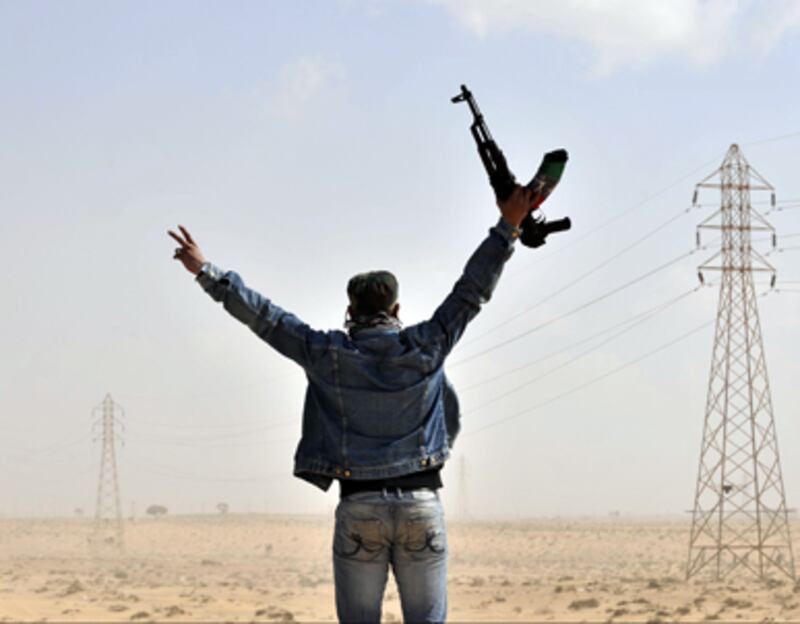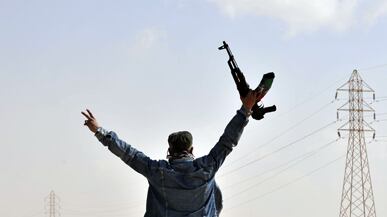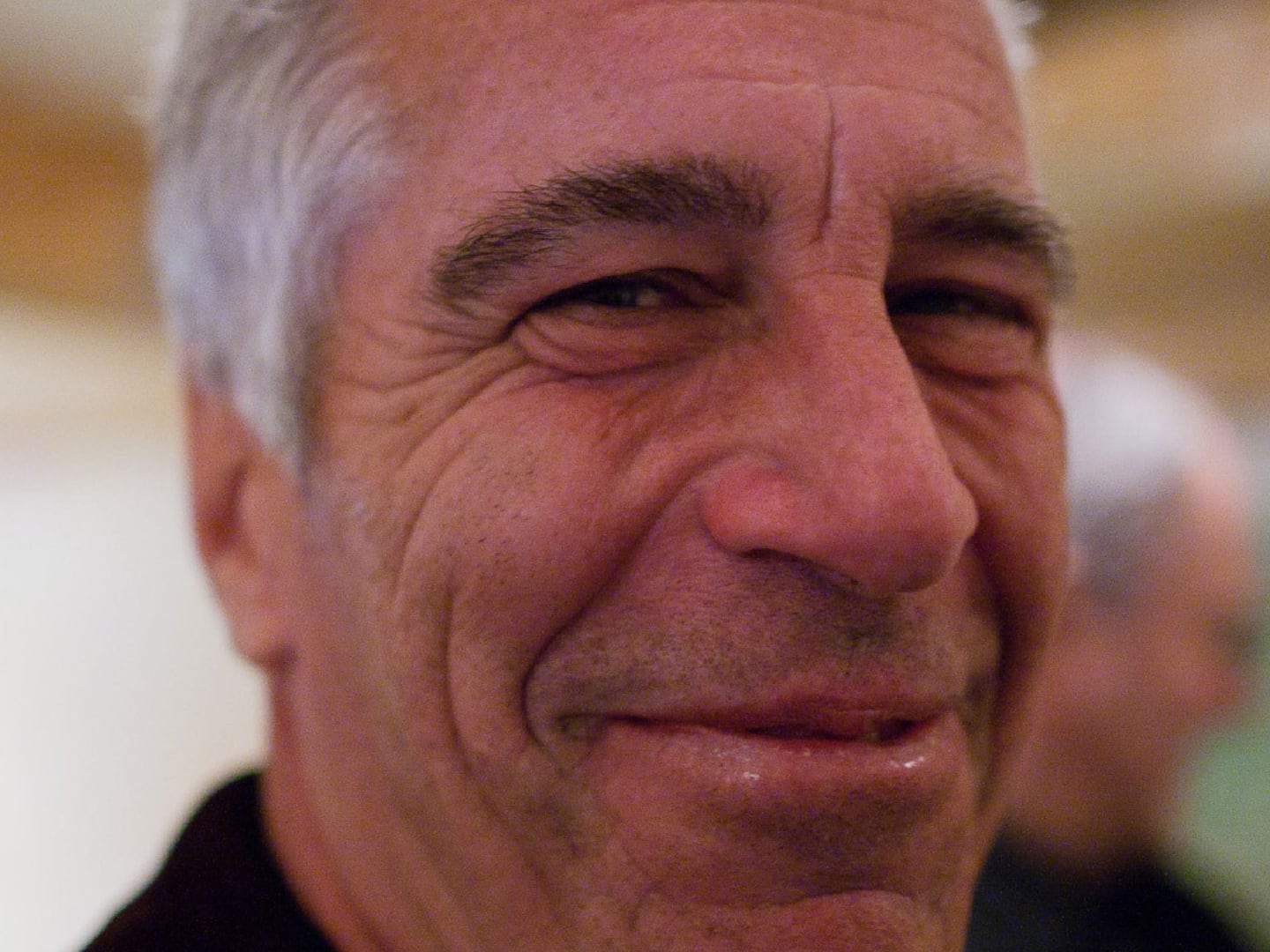With NATO about to take charge on Libya, what happens now? Seven expert analysts weigh in on what the U.S. should do—and what it should avoid.
As the U.S. prepares to hand over leadership to NATO, analysts and commentators are wondering what will happen next. Can the U.S. extricate itself from a third conflict in the region, or will the airstrikes escalate? Will the rebels be able to take down Gaddafi without ground support, and what happens if they can’t? The Daily Beast rounds up seven takes on how the U.S. should proceed—and what pitfalls to avoid.

At The New Republic, William Galston critiques political philosopher Michael Walzer’s case against intervention in Libya using Walzer’s own writing, from 1977. “When a people are being massacred, we don’t require that they pass the test of self-help before coming to their aid. It is their very incapacity that draws us in. ... Any state capable of stopping the slaughter has the right, at least, to try to do so,” Galston quotes Walzer as saying. In Libya’s case, he says, we had an obligation to intervene because our military strength makes us uniquely capable to do so, and we were right to do so without waiting for a full-scale massacre to occur. Intervening to stop a civilian massacre is one thing, though, and regime change is another. If Gaddafi manages to hang on to power, Walzer worries, we may have committed ourselves to “protecting ‘Benghazistan’ against retribution for the indefinite future. We’ve seen that movie before. Let’s hope this one ends better.”
Retired Air Force Commander Charles Horner says that air power could be enough, but it will take more than a no-fly zone. The rebels don't have the arms or organization they need to defeat Gaddafi’s ground forces on their own, but they might be able to with the help of targeted airpower. “It may not be sporting to take out tanks with precision munitions dropped from a stealth bomber above 25,000 feet,” Horner writes, “but it is effective.” Poorly armed ground forces succeeded with air support in Afghanistan and Kosovo, says Horner, and they can in Libya, provided the U.S. doesn’t delay. “The actions to date against Gaddafi have failed to bring about the desired end state. The start of this war was characterized by half-measures, ill-defined thinking, and conflicting political objectives. Now, to end it, we need to build on our remaining strengths.”
“Libya’s conflict will likely end as most civil wars end: through a negotiated settlement under which the rebels receive substantial political autonomy.”
Fareed Zakaria also worries about the endgame being a partitioned Libya, with Gaddafi in control of Tripoli and the rebels, Benghazi, protected by a permanent no-fly zone. To prevent such a scenario, he recommends arming the rebels, something he says we should have been doing from the beginning. “In the past, America has been able to fund guerrilla wars quite effectively,” writes Zakaria, and “Most important, this prevented Washington from getting onto a slippery slope of military escalation.” Whatever Obama does, though, he shouldn’t listen to people who warn that America will lose face if Gaddafi doesn’t fall and increase military involvement. Historically, “Those who didn't want to be seen as 'losing a country' often ended up losing a lot more.”
In a New York Times “Room for Debate” panel, Andrew Bacevich says the United States’ primary objective needs to be to “end this needless war promptly and with as little embarrassment as possible.” The U.S. has two ways to do this: Remove Gaddafi to leave on his own, “by offering him inducements—the promise of a comfortable exile in Venezuela perhaps”; or by bringing about “a departure that is involuntary, violent, and therefore permanent.”
On the same panel, Micah Zenko, while saying that the U.S. never should have found itself in the position of fighting in Libya, says the U.S. should now turn to the African Union to arrange a negotiated peace. “Libya’s conflict will likely end as most civil wars end: through a negotiated settlement under which the rebels receive substantial political autonomy,” says Zenko. “Enforcing such a cease-fire will require tens of thousands of peacekeepers operating under an international mandate.” He says the Obama administration should start preparing the African Union for this role.
Adam Garfinkle warns that even if the U.S. hands over leadership to France and the U.K. , they may have to take it up again if those countries can’t succeed in ousting Gaddafi, the allies’ implicit goal. It’s one critique of the intervention among many others, including that the rebels aren’t civilians but partisans in a civil war, and that therefore the argument that we intervened to avert a massacre is invalid. Garfinkle writes: “We’ve started a war we won’t know how to end. We have a great deal riding on the success of the Franco-British operation, assuming one actually takes shape in a hurry. If it doesn’t work, the U.S. government is very likely going to be dragged, even with the president privately kicking and screaming all the way, to a mission definition (again, the only logical one available) that will presage an open-ended commitment.”
James Kitfield wonders what happens after Gaddafi falls. He sees three major pitfalls: One, there’s a risk that the rebels won’t be as secular as the U.S. would like them to be; two, Arab support seems to be fading; three, the lack of troops on the ground means the fall of Gaddafi could result in anarchy and prolonged fighting among tribes and factions. He quotes Max Boot of the Council on Foreign Relations: “Libya is essentially a one-man state, so when Gaddafi disappears there will likely be no Libyan military to oversee its democratic transition, and you could see a competition among the tribes and possibly jihadists for control of its oil resources. So there’s a grave danger this starts to look like Iraq redux.”
Josh Dzieza is an editorial assistant at The Daily Beast.





